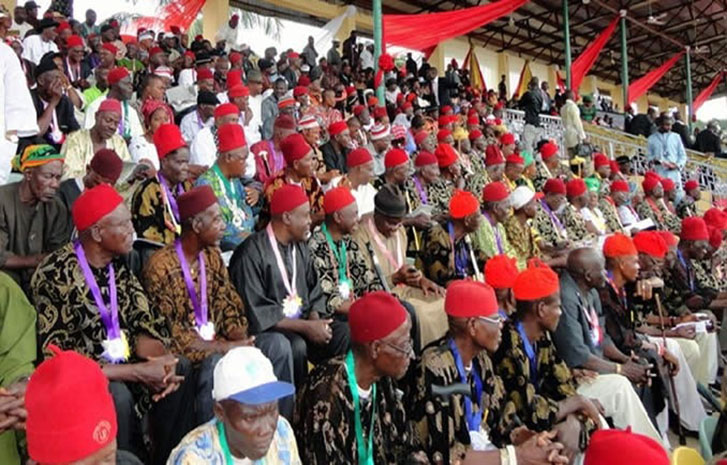As the curtain sets to be drawn on January 9, 2020, marking the end of Chief Nnia Nwodo-led leadership of the apex Igbo socio-cultural organisation, Ohanaeze Ndigbo, many prominent Igbo citizens from Imo State have started jostling to succeed him.
In line with the Ohanaeze constitution, the three-year tenure of the presidency of the organisation rotates in alphabetical order among the five Igbo-speaking states of Southeast and the Igbo speaking parts of Delta and River states.
Abia State had the first slot with Prof. Joe Irukwu as the president. Thereafter, it shifted to Anambra, with the late Dr. Dozie Ikedife, picking the leadership ticket. The late Ambassador Raph Uwechue from Delta State was in the saddle as the president. He later vacated the position for Ebonyi State’s Chief Gary Igariwe. At present, Chief Nnia Nwodo from Enugu State, occupies the office. But starting from January 9, 2020 when a new leader will be chosen to succeed him, the mantle of leadership of the socio-cultural organisation will reside in Imo State. By 2023, it moves to Rivers State.
Expectedly, gladiators comprising technocrats, politicians, academics, are jostling to succeed Chief Nwodo. Some of them are: Former Nigerian Ambassador to the United States, Prof. George Obiozor; former Imo State governor, Chief Ikedi Ohakim; policy consultant, Dr. Chris Asoluka; former Secretary-General of Ohanaeze, Dr. Joe Nwaogu; former Vice Chancellor of Imo State University, Prof. Ukachukwu Aloysius Awuzie; Professor of Law, and former Dean, Faculty of Law, Imo State University and an astute politician, Dr. Nnaemeka Onyeka Obiaraeri.
As things stand now, none of the aspirants has made a public declaration of their intention. However, Saturday Sun findings reveal that they are making underground moves meeting critical stakeholders who they feel can facilitate their victory. By the end of the year and the first week of next year, some of them would be addressing world press conference where they would indicate their intention and reel out their programmes for the organisation.
Ohanaeze represents all Igbo within and outside Nigeria
Although the group is not a political party, part of its objectives is to foster unity among its members to allow them have a united voice within the political firmament of Nigeria.
After the Nigerian civil war, some prominent Igbos gathered to proclaim the need to unify Igbos under a common umbrella body. This initiative was much welcomed considering maximum displacement of the Igbos during the war and its aftermath.
An organization named the Igbo National Assembly (INA), was created. This organisation was later banned by the Federal Military Government at the time, probably due to the government’s fear of a grand suspicious agenda being cultivated by the Igbos via the organisation; hence, the creation of Ohanaeze Ndigbo, in 1976.
Prof. Ben Nwabueze, a foremost constitutional lawyer, assembled prominent Igbo leaders to form the organization and later emerged the Secretary-General, spanning a period of 20 years. The organisation was effectively championed and supported by Dr. Kingsley Mbadiwe, Dr. Francis Akanu Ibiam, Dr. Michael Iheonukara Okpara, Dr. Pius Okigbo, and Chief Jerome Udorji, among other notable Igbo personalities.
The kind of president we need – Igbo intelligentsia
Brady Chijioke Nwosu, a public opinion analyst and Imo State governorship candidate in the last election, said, the next Ohanaeze president must be an accomplished person, with a great strength of character and must have a positive aura that would attract people to him. According to him, the outgoing president is leaving a big shoe, and his successor must be a true leader with great vision, if the shoe is going to size him.
Nwodo, he said, came at a turbulent time in the history of the Igbo after the civil war. “He had the Independent People of Biafra (IPOB), and Nnamdi Kanu issues to contend with,” he said. “He also came at time when the Igbo were being excluded from every meaningful and strategic position in the country by the President Buhari government, a time when the Igbo didn’t seem to have any political bearing, and some other challenges confronting the race.”
Despite the seemingly insurmountable challenges, he believes that Nwodo didn’t falter; that he lived up to expectation. “Nwodo leadership has accomplished so much but a lot more needs to be done in the years to come,” he noted.
On the kind of president that should replace him, he said: “We need an Ohanaeze president who will exceed his great accomplishments, who will not speak with tongue-in-cheek, or afraid to articulate the group’s position on any national issue.
“Anyone who is still a practising politician and intends to go into elective political positions after office should not consider himself for the office. That office is the face of every Igbo man and should be hallowed. The president should be above board and must have clout, both locally and internationally, and must be seem to command respect among the various ethnic groups in Nigeria; intellectually, he must stand very tall.”
Setting agenda for the next president, the president of political pressure group in Ohafia, Abia State, Mben Political Assembly (MPA), Dr. Lucas Onu, said, the umbrella group needs to, among other things reorient the Igbo, and work to make sure that the race is no more seen as disorderly people who speak with discordant voices on matters that affect them; a people seen as not taking a common stance on any issue.
He further advised: “He must continue to pursue the handshakes across the Southwest, South-South and the Middle Belt that Nwodo has nurtured. More than anything, he should be aggressive in pursuing the “Think Home” doctrine for Igbo businessmen, to relocate some of their factories to Southeast in order to buoy up the economy of the zone.”










